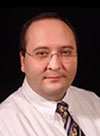Invited Talk January 2007
Invited Talk by Prof. Luc Soler

|
Prof. Luc Soler
(Department of Digestive and Endocrine Surgery, University Hospital, Strasbourg) will be giving an invited talk on Tuesday, Jan. 30, 9:30, in Garching, Room MI 01.07.023.
on
"Virtual Reality and Robotics for Detection and Treatment of Abdominal Cancer in animal preclinical studies and clinical use"
|
Abstract:
In the fight against cancer, early tumour detection, treatment and follow-up enable to improve the survival rate of patients. However, current imaging techniques do not allow to perform these operations for tumours smaller than one centimetre. The aim of our work is to set up new techniques for the detection, 3D delineation and 4D time follow-up of small abdominal lesions from standard medical images (CT scan, MRI). It also aims at developing innovative systems making tumour resection or treatment easier with the use of pre-operative planning, simulation, augmented reality and robotized systems, increasing gesture accuracy. It also permits a real-time long distant connection between practitioners allowing them to share a same 3D reconstructed patient as well as to interact on a same patient, virtually before the intervention and really during the surgical procedure thanks to a telesurgical robot. In preclinical studies, our first results obtained from a micro-CT scanner show that these technologies allow to obtain an efficient and precise 3D modelling of anatomical and pathological structures of rats and mice. In clinical studies, our first results show the possibility to improve the therapeutic choice thanks to an improved detection and representation of the patient before carrying out the surgical gesture. Moreover, preoperative simulators including the 3D model of the operated patient offer a new way of preparing the surgical procedure. These results also show the efficiency of augmented reality that provides a virtual transparency of the patient in real-time during the operative procedure. It represents thus a new form of fight against cancer, the usefulness and pertinence of which have been proved.
 Abstract (0.6MB)
Abstract (0.6MB)

 Abstract (0.6MB)
Abstract (0.6MB)

